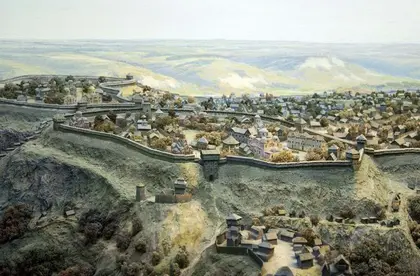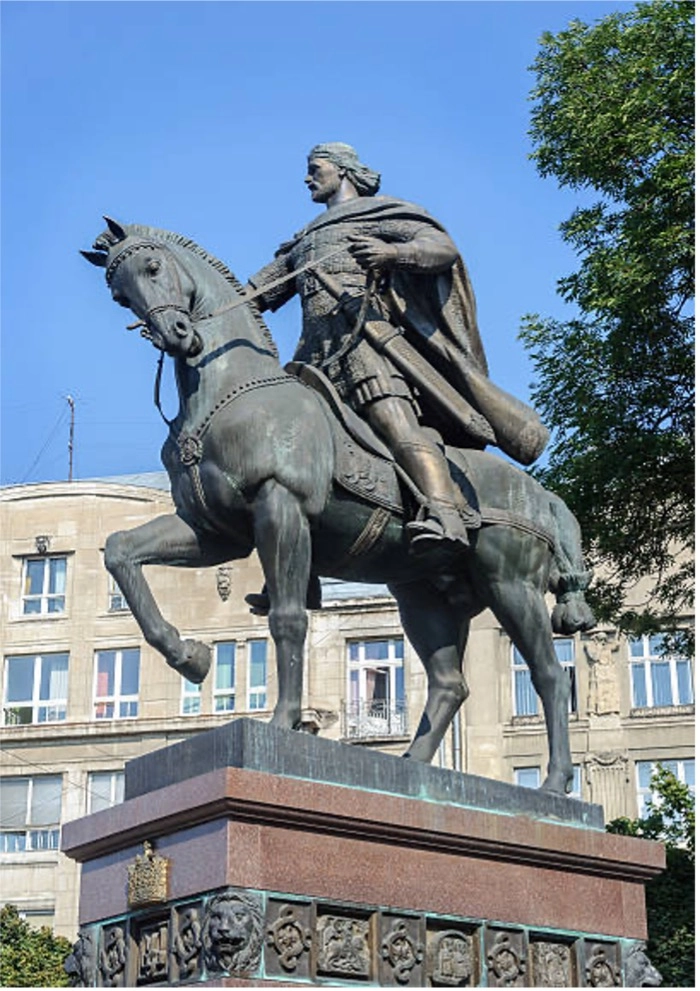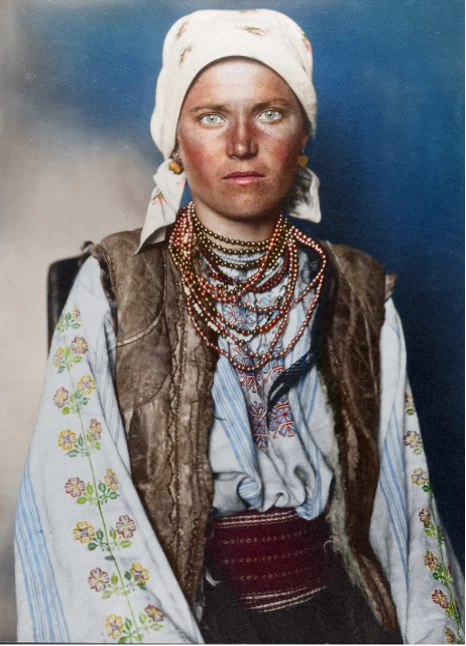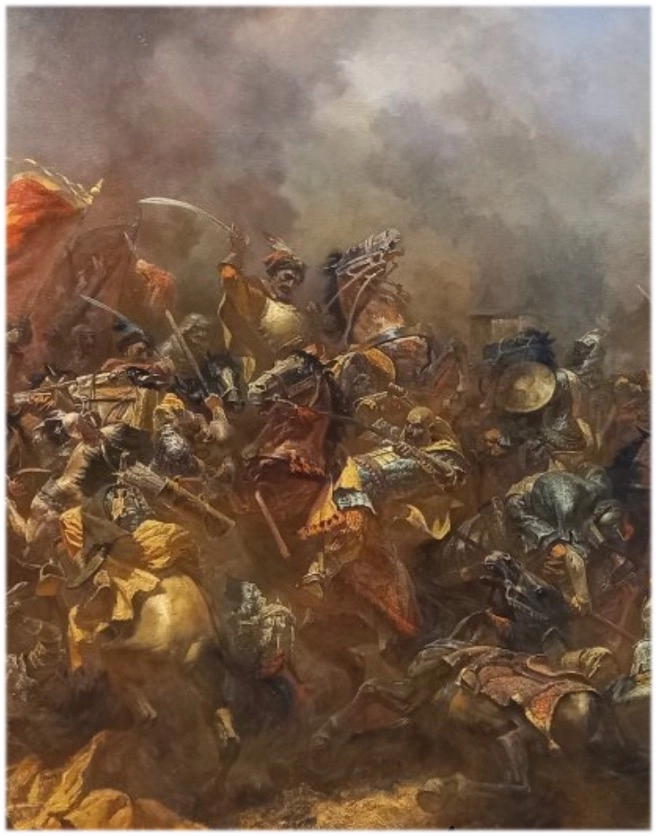On the eve of Russia’s full-scale invasion of Ukraine on Feb. 24, 2022, Vladimir Putin published his essay, “On the Historical Unity of Russians and Ukrainians.” In it he explains why he believes Russians and Ukrainians are “one people – a single whole.” Putin amplifies the idea that Ukraine should be and always was a part of Russia. Many in the West are indifferent to Russia’s invasion, some even go as far as to say: “Why should we care about a boundary dispute?”
Contrary to Putin’s statement, Ukraine is fundamentally different than Russia. It is important to restate the central principle which divides Ukraine and Russia: their systems of government. Yes, Ukrainians and Russians have a common predecessor in Kyivan-Rus dating back 1,000 years. But just as families can grow apart and seek different paths, Ukrainians and Russians have grown apart over the centuries. They have adopted fundamentally different views of the relationship between the individual and the state. The history is long and complex, but a concise background for the reader is in order.
JOIN US ON TELEGRAM
Follow our coverage of the war on the @Kyivpost_official.
Where the histories split
Ukraine and Russia trace their histories back 1,000 years to Kyivan-Rus (or simply Rus). The collection of principalities known as Rus had its capital in the city of Kyiv. Rus lands occupied the river systems between the White Sea near Finland and the Black Sea, part of a flourishing trade route that linked the Scandinavians and Byzantine Empire.
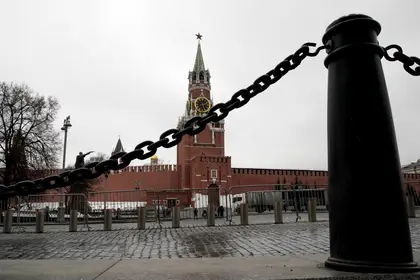
Epilogue of the Russian Empire Wanted
Out of the many Rus principalities, two of them are most relevant for this discussion. The first is Vladimir-Suzdal in the northeast of Rus, which later became part of Muscovy with its capital Moscow. The second is the principality of Galicia-Volhynia in the far west of Rus, which later became part of present-day Ukraine. In the 13th century, Galicia-Volhynia was ruled by Prince Danylo and his sons.
Rus prospered for around 400 years. Among the Rus princes, the Grand Prince of Kyiv was viewed as first among equals, not an absolute ruler, with frequent infighting among the princes for status and power. With its loose political structure and lack of coherence, Rus was vulnerable to an organized military society like the Mongols.
The Mongol Empire, ruled first by Genghis Khan, and then by his sons, was the largest land empire the world has ever known. It stretched across Eurasia from the Pacific Ocean to present day Poland. The Mongols first entered Eastern Europe around 1223, after having first conquered much of China, and the great nations of Central Asia. During this time even great centralized powers like Persia fell to the Mongols. The loose structure of Rus could not resist the Mongol war machine. In the end, the Mongols conquered almost all of Rus. Grand Prince Yuri II of Vladimir-Suzdal was killed in 1238 at the Battle of Sit River and the capital Kyiv was razed to the ground in December of 1240.
Regarding the Mongol invasions, Putin glosses over the topic in his essay, “On the Historical Unity of Russians and Ukrainians.” Offering a cursory history he states: “The northeastern part of Rus fell under the control of the [Mongols] but retained limited sovereignty. The southern and western Russian lands largely became part of the Grand Duchy of Lithuania, which – most significantly – was referred to in historical records as the Grand Duchy of Lithuania and Russia.”
Putin is correct that Vladimir-Suzdal and Galicia-Volhynia had differing experiences during and after the Mongol invasions. As Putin describes above, Vladimir-Suzdal, with its lands in the northeast, was under direct vassalage of the Mongol invaders, and retained little sovereignty. The cities in Vladimir-Suzdal began to prosper under the control of the Mongols due to access to trade routes to Asia, like the Silk Road. A great exchange of culture, ideas, and goods occurred.
Putin’s crucial lacuna: contact with the seeds of democracy
Putin leaves out a crucial bit about the western Rus lands of Galicia-Volhynia. He states a half-truth. Western Rus lands became part of the Grand Duchy of Lithuania and Ruthenia, not “Russia.” Further, Putin ignores the fact that western Rus lands in Galicia-Volhynia retained sovereignty for well over 100 years under Prince Danylo and his successors until 1340. Danylo’s lands prospered, and even grew, and did not experience the type of vassalage the Mongols were exerting over Vladimir-Suzdal.
In his essay, Vladimir Putin leaves out any mention of Danylo, who is a crucial figure in understanding Ukraine. Unlike Vladimir-Suzdal, which had greater ties with Asia due to Mongol vassalage, Galicia-Volhynia was now becoming a part of Europe under Danylo.
Danylo’s rule was characterized by his political maneuvering to appease Mongol generals. He met with Mongol generals on numerous occasions, accepting them as “rulers” in principle. Danylo established ties with Hungary and Poland during these times. This was all done with the intention of deterring the Mongols and expanding and strengthening Galicia-Volhynia.
Danylo appealed to the Pope Innocent IV in Rome to send a crusade to help him expel the Mongols. Although the Pope did not send troops, the Pope granted Danylo the title, King of Ruthenia. Ruthenian being the Latin term for “people of Rus.” Ukrainians, before calling themselves Ukrainians, called themselves Ruthenians well into the 20th century.
Danylo’s son Lev further expanded the territories of Galicia-Volhynia. He facilitated the growth of Lviv, the major city in the region, named after Lev himself. Lev’s son Andrew continued his grandfather Danylo’s work, keeping firm European relations with the Poles and the 14th century German states. Eventually, Galicia-Volhynia was incorporated into the Grand Duchy of Poland and Ruthenia. The people of Galicia-Volhynia, again called Ruthenians in the sources, retained control over their language and culture, and thus the foundations were laid for the Ukrainian identity, one that was European, and exposed to major European movements like the Renaissance, Enlightenment, and Humanism.
The Grand Duchy of Lithuania and Ruthenia, as well as its successor, the Polish-Lithuanian Commonwealth, were characterized by a decentralized government where every noble member of the Parliament, or “Sejm,” could veto legislation. The Sejm, which included many Ruthenian members, exposed Ukrainians to the benefits and problems of democracy.
(Above: Portrait of a Ruthenian woman at the Ellis Island Immigration Station, 1906. Photo colorization by Sanna Dullaway for TIME / original image: The New York Public Library)
After the decline and fall of the Polish-Lithuanian Commonwealth, between 1772 and 1795 western Ukrainian lands were absorbed into the central European Hapsburg Empire (later Austro-Hungary), ushering in a period when Lviv and Milan were part of the same state. Austro-Hungary became a constitutional monarchy in 1867, and Ruthenians elected members to the legislature. Again, Ukrainian lands were part of a democratic, European state.
As Europe experienced the Enlightenment, Ukrainians grew along with it. Beyond Ukrainian inclusion into Central European governments, a second foundation for freedom arose. In the south, during the 16th century, Ukraine was protected by the freedom-loving Cossacks, who elected their own leaders, and would fight anyone who tried to place limits on their freedom. The famed historian of Russia Mykola Kostomarov said of Ukraine that its “Cossack origins had made it democratic and egalitarian… they had no tsars… they had no nobility.”
Moscow stuck in a Mongol mindset
By contrast, Vladimir-Suzdal, and later Muscovy, was still firmly under Mongol rule until the late 15th century. By this time, Muscovite culture was heavily influenced by the Mongols – much of the nobility was of Mongol descent. However, the Mongol rule over Muscovy began to collapse with the Battle of Kulikovo in 1380. The Battle on the Ugra River in 1480 marked the end of Mongol rule over Russian lands. The Grand Prince of Muscovy took the title of Tsar of all Rus. And Muscovy, only began to be called “Russia” in 1547.
Muscovy and its tsars viewed strength as the primary virtue needed to expel the Mongols and protect the viability of the state. As a result, Muscovy had a view of the state that led to its constant expansion and absorption of surrounding areas for centuries. The individual was subordinated to the needs of the state, and the tsar the absolute autocrat. This was a powerful and successful model in world affairs during that violent era. It led to the defeat of the Mongols and the ever-expanding Russian Empire in successive centuries, to the point where the Russian Empire became, as Russia remains today, the largest country in the world.
Today’s Russia and Vladimir Putin are the heirs of this theory of the absolute dominance of the state over the individual and the need for an autocrat to rule with an iron fist and conquer new lands. Putin has adopted all the old imperial symbols, like the double headed eagle; and his ceremonial guards wear 19th-century imperial uniforms. Today many Russians are deeply aware of their history, and support Putin in his war against Ukraine. In fact, many Russians still have favorable views of Stalin despite his horrific cruelties. Russia’s absolute disregard for its battlefield casualties both in World War II and during this current war with Ukraine is an example of the consequences of such a system.
This history makes clear: Ukraine was long a part of Europe, rather than Putin’s “Russian world.” When the 13th century Mongol invasions destroyed Rus, Galicia-Volhynia and Vladimir-Suzdal were split. This split initiated the divergence of the Ukrainian and Russian identities and styles of government.
Today’s European trajectory
The history explains why today Ukrainians are a European and democratic people who favor freedom and democracy. It explains why Ukrainians fought many battles against the ever-expanding Russian Empire, including under Petro Sahaidachny in the Polish-Muscovite War of 1605 in alliance with Poland or under Ivan Mazepa in the great Northern War of 1700-1722 in alliance with Sweden. Even the horrific Holodomor in 1932-33, when Stalin created an artificial famine and killed countless millions to break the will of the Ukrainian peasant farmers who refused to give up their land, shows the persistent freedom-loving nature of Ukrainians.
(Above: Ukrainian Hetman Petro Sahaidachny at the 1621 Battle of Khotyn where he was mortally wounded. Credit: Andrey Serebryakov).
Now, Ukraine is fighting for its survival against a great autocracy that denies Ukraine’s very existence. But more than just a struggle of a free people against a large and powerful neighbor, this is a struggle to define the relationship between a people and its state. Is Putin’s Russia the model we want to be victorious? Is the state supreme above all other concerns, including the rights of the individual? Or is Ukraine to survive? Do the Western ideals of freedom and democracy matter?
The answers to these questions have global implications. Is the future of mankind in an era of ever more powerful Artificial Intelligence one of constant surveillance to achieve the total subordination of the individual to the state? This prospect is far more frightening than George Orwell imagined in 1984. Or do individual humans and human rights matter? Is our collective future full of light and liberty?
In every nation’s history, there comes a time when it must earn its freedom. Most cannot do it alone, witness the French aid which allowed the American Revolution to succeed against the most powerful country in the world at that time, the British Empire. Now is Ukraine’s time, and the time for all freedom-loving peoples to defend their collective future.
You can also highlight the text and press Ctrl + Enter


